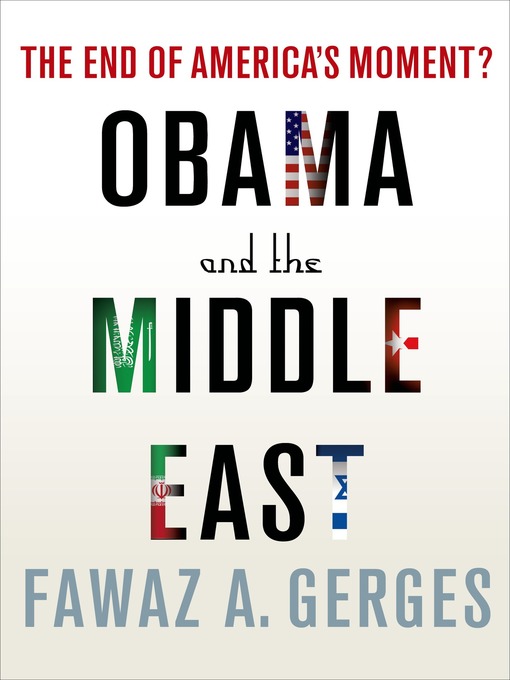
Obama and the Middle East
The End of America's Moment?
کتاب های مرتبط
- اطلاعات
- نقد و بررسی
- دیدگاه کاربران
نقد و بررسی

April 30, 2012
The ever-shifting geopolitical, cultural, military, and religious dynamics of America's engagement with the Middle East is optimal ground for serious inquiry in this thoughtful examination of America's standing in the region. Gerges (The Rise and Fall of Al-Qaeda), chair of the Middle Eastern Center at the London School of Economics, deftly condenses many yearsâfrom the Eisenhower Doctrine, to the origin of America's "special relationship" with Israel, to the Arab Springâinto an easily digestible history rife with spot-on analysis. His historical investigation into America's mercurial relationships with the region's dictatorsâe.g., in the case of Saddam Hussein, going from preventing a UN investigation into his use of chemical weapons to handing him over to the Iraqi Special Tribunal, which found him guilty of crimes against humanityâis juxtaposed with an honest and thorough analysis of how President Obama "has shown no desire to alter the dominant foreign policy narrative on the Middle East." The book is a strong and informative primer on American involvement in the Middle East, but Gerges misses his chance to offer up concrete solutions, beyond positing that Obama must "take risks on people's aspirations for open and representative government" and "seize the moment andâ¦structurally reorient American foreign policy." Announced first printing: 50,000.

Starred review from March 15, 2012
Gerges (Middle Eastern Politics/London School of Economics; The Rise and Fall of Al-Qaeda, 2011, etc.) succinctly traces the history of the West's relationship with the Middle East and pulls no punches as he iterates the trail of failed policies. The Middle East has always been a hotbed, but now it is a conflagration waiting to ignite. The dissolution of trust and friendship toward the West, beginning with French and English imperialism up to the current Israeli doctrine of permanent conflict, is reaching critical mass. These ex-colonies wanted development, modernization and relief from economic hardship, while all the West wanted was to thwart communism and control the area's oil. Policy decisions were based on containment of the Soviets, but the focus has now shifted to stifling Iran's influence and that of militant Islamism. As a leading authority on the Middle East, Gerges' extensive research and analysis exposes the effects of the Palestinian-Israeli conflict, the war on terror and the emerging power of Turkey, Iran and Egypt. The author excoriates the Bush administration and its imperialistic "continuity of failure," from the act of rejecting Iran's offer of help after 9/11 to unilateral war in Iraq. The president's neoconservative advisers used exaggeration, overreaction and crusading impulses to further their goals, tactics that poisoned the entire Middle East against the United States. Obama's attempts at conciliation have been repeatedly stymied by the constraints of the American political system and his own protracted efforts to build consensus. Frustrated Arab states are weary of rhetoric and distrust America's inaction as they turn to the rising powers of Turkey, Egypt and Iran for solutions. Gerges lays out the problems from multiple viewpoints and establishes the points of greatest need. How Obama addresses the challenge to America's hegemony and whether he can stand up to political pressure from home will determine if this is truly the end of America's moment in the Middle East. An exceptional book that thoroughly scrutinizes the struggles of all the nations of the Middle East and doesn't hesitate to distribute blame where it's warranted.
COPYRIGHT(2012) Kirkus Reviews, ALL RIGHTS RESERVED.

March 15, 2012
Gerges (Middle Eastern politics & international relations, London Sch. of Economics and Political Science; The Rise and Fall of Al-Qaeda) provides an analysis of U.S. interaction with the Middle East during the first three years of the Obama presidency. During his election campaign and in early presidential speeches (most notably in Cairo), Obama expressed a desire to create a new beginning for U.S.-Middle East relations. Gerges examines the gaps between this optimistic rhetoric and the reality of Obama's policies while framing those policies within their historical context. Some of the specific areas he focuses on are the Israeli-Palestinian peace process, the War on Terror, the 2011 Arab Spring, and the roles of pivotal states such as Egypt, Iran, and Turkey. In Gerges's assessment, Obama's approach has more closely resembled the realism of post-World War II America than the promised transformative path. He states that without a change in course from a kind of Cold War mentality, the continued decline of U.S. influence in the region is virtually assured. VERDICT Despite the complexity of the issues involved, this is a highly readable book, recommended for anyone who regularly follows the news in this region.--Brian T. Sullivan, Alfred Univ. Lib., NY
Copyright 2012 Library Journal, LLC Used with permission.

























دیدگاه کاربران